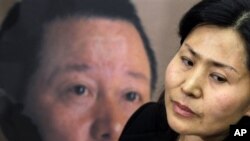China denies knowledge of several cases of dissidents who have recently disappeared. These include an ethnic Chinese-Australian man who was an outspoken critic of the Chinese government, online, and a lawyer who was the focus of a report by a United Nations human rights group.
Reporters asked about two specific cases at Tuesday’s Foreign Ministry briefing.
One involved Chinese-Australian writer Yang Hengjun, who disappeared in China a few days ago. The other case is that of Gao Zhisheng, a human rights lawyer who disappeared into police custody, nearly a year ago.
Chinese Foreign Ministry spokeswoman Jiang Yu says she has not heard of Yang Hengjun. She also says she does not know about Gao Zhisheng’s specific case, but notes a report issued by the United Nations Working Group on Arbitrary Detention calling for Gao’s release.
Jiang says China "attaches importance" to cooperating with the U.N. group. However, she also urges the group to respect China’s judicial sovereignty in what she describes as an "objective and just manner".
|
Listen to this interview on Gao with Maran Turner, Executive Director of Freedom Now
|
The U.N. working group issued a report Monday accusing the Chinese government of detaining Gao, in violation of Chinese and international law. The group expressed regret that the government did not provide the information it had requested.
The working group is an independent body composed of human rights specialists from Senegal, Pakistan, Chile, Norway and Ukraine. It files its reports to the U.N. Human Rights Council.
Meanwhile, Sino-Australian blogger Yang Hengjun has disappeared. Yang has not been seen since he called a friend from the southern Chinese city, Guangzhou, Sunday, and said he was being followed by three men.
Joshua Rosenzweig is with the Duihua Foundation, a group that monitors cases of political prisoners in China. He says he is most alarmed that government critics, like blogger Yang, have just disappeared into legal limbo.
"What strikes me about the arrests and disappearances, over the past months, is the level of disregard, apparent disregard for legal procedures, which is much more worrying - it is a symbol of the state of rule of law in China at this particular moment," Rosenzwweig said.
He says Yang Hengjun is often "quite critical" of the political and social situation in China, but is also very careful in how he expresses his views.
In a February interview, Yang indicated that there is what he described as "high pressure" not to write anything online about Egypt, where a mass uprising forced the president to resign.
Yang describes the system of censorship in China as much stronger than that of any other country. He says, if China did not have the censorship capabilities it has, it might become what he described as "a new Egypt."
Meanwhile, news of the disappearances come amid legal developments in other cases, including the announcement of official subversion charges against detained blogger Ran Yunfei and a 10-year jail sentence to activist Liu Xianbin, who was convicted of subversion.




